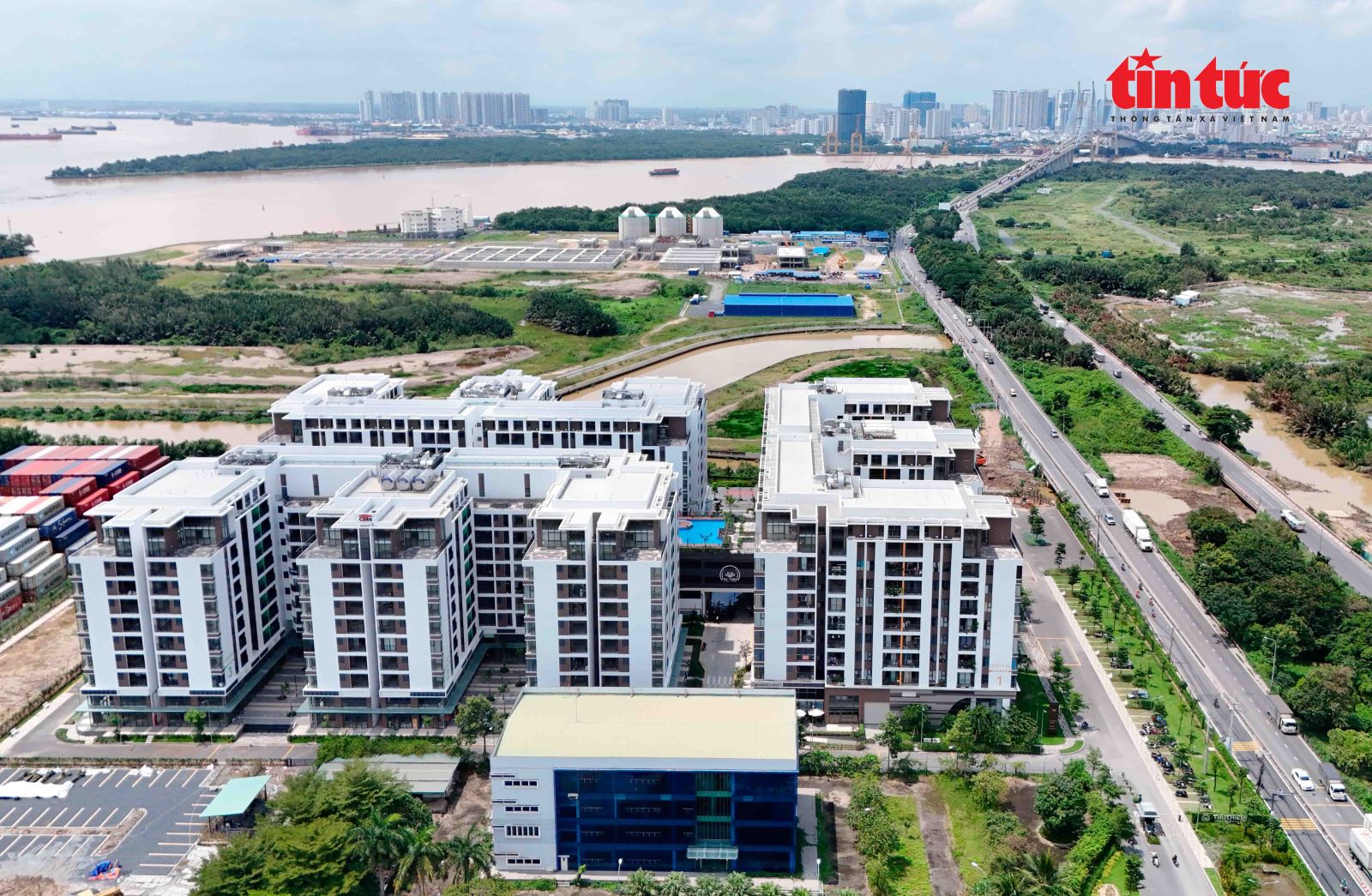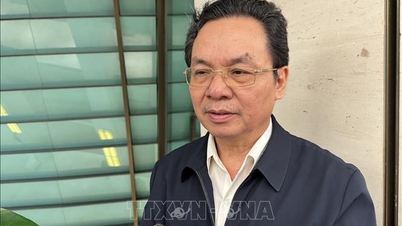
Solving the housing pressure problem
According to statistics from the Ministry of Construction , the country currently has more than 2.4 million industrial park workers and millions of low-income urban workers in urgent need of housing. However, the supply of social housing only meets about 40% of actual demand.
Meanwhile, commercial housing prices have continued to rise rapidly. In Hanoi , the average apartment price has increased from VND25 million/m2 in 2015 to over VND85 million/m2 at present. The price gap has more than tripled in less than 10 years. Similarly, in Ho Chi Minh City, the common price has also exceeded VND90 million/m2, making home ownership almost impossible for middle-income earners.
Dr. Nguyen Van Dinh - Vice President of the Vietnam Real Estate Association - commented that housing prices are increasing faster than people's incomes, making the need for social housing and low-cost rental housing urgent. The establishment of the National Housing Fund is the right step to fundamentally solve this problem.
According to Mr. Dinh, in fact, the social housing policy has been implemented for a long time, but limited resources, complex capital allocation mechanisms and controlled investment profits have made businesses less interested. This situation leads to an imbalance between supply and demand, putting great pressure on the urban housing market. However, the formation of the National Housing Fund can be considered a new institutional step.
In Resolution 201/2025/QH15, the National Housing Fund is defined as a non-budgetary state financial fund with legal status and operating not for profit. The Fund consists of two levels: the Central Fund, established and managed by the Government; the Local Housing Fund, organized and operated by the Provincial People's Committee according to a unified mechanism.
The fund's capital is formed from many channels: state budget allocation; value of land fund invested in technical infrastructure; revenue from selling and leasing public housing; money from auctioning land use rights; and other legally mobilized and sponsored funds at home and abroad.
The fund's core mission is to invest in the development of social housing, rental housing and lease-purchase housing, especially serving officials, civil servants, employees, laborers and workers. In addition, the fund also participates in supporting investment in technical infrastructure and social infrastructure of social housing projects.
Dr. Vo Tri Thanh - Member of the National Financial and Monetary Policy Advisory Council assessed that if designed and operated transparently, the National Housing Fund could become an important policy tool, similar to housing fund models in Korea or Singapore. This is the foundation for forming a sustainable housing finance ecosystem, helping millions of people have the opportunity to settle down.
This expert analyzed that the establishment of the National Housing Fund brings three big expectations to the people. First, the fund will create more supply of affordable housing through investment or co-investment in social housing projects and rental housing. When there is more supply, the pressure on commercial housing prices can be reduced, and people will have more options suitable to their income.
Next, the fund will directly support those in real need, especially young workers, industrial park workers, newly graduated officials and civil servants - those who currently have almost no access to commercial housing. Localities can use capital from the fund to provide preferential loans or invest in building rental housing funds according to a revolving mechanism.
In particular, the fund will contribute to the development of synchronous urban infrastructure, because social housing projects invested by the fund will be required to be linked to transport infrastructure, schools, health care, and public services. This will not only help people "have a home", but also "have a place worth living".
However, according to economist Dinh Minh Tuan, for the fund to be effective, a diverse capital mobilization mechanism is needed. The capital source for this fund should not only rely on the state budget. It is necessary to clearly define the contribution ratio from the following channels: the State, banks, businesses, people and international organizations. Only then will the fund have long-term vitality and avoid dependence.
Overcoming challenges, opening up housing opportunities
Experts generally agree that despite high expectations, the National Housing Fund still faces many practical challenges. The biggest and first problem to be faced is capital.
The establishment of the fund with an initial charter capital of about VND5,000 billion, increasing to VND10,000 billion in the first 3 years is considered a modest start compared to the need of hundreds of thousands of billions of VND each year for social housing development. Therefore, attracting social resources is an urgent requirement.
Along with that is the operating and monitoring mechanism. As an extra-budgetary fund, operating as a state-owned enterprise, the National Housing Fund will have to have a transparent management mechanism, independent audit and public use of capital to avoid risks and losses.
Mr. Le Van Binh - Deputy Director of the Department of Land Management (Ministry of Agriculture and Environment) said that it is necessary to clearly stipulate the mechanism for capital advance, lending and capital recovery so that the fund can operate effectively, avoiding the situation of capital "stagnating" without creating actual products.
In addition, it is necessary to identify the right beneficiaries. Because in reality, many previous social housing projects still have the situation of "those who need it cannot buy it, those who can buy it do not need it". Therefore, the access criteria and approval mechanism need to be more transparent, flexible, and suitable to the actual income in each locality.
In addition, the quality and location of housing are also key factors. If social housing is built far from the center and lacks infrastructure, people will still have to bear high transportation costs even if they rent cheap houses.
Regarding this content, Dr. Vo Tri Thanh emphasized that the National Housing Fund does not only address quantity, but must also aim to improve the quality of life. Social housing must be close to the workplace, have services, and convenient transportation. Only then will people truly have a stable home.
For expectations to become reality, experts agree that for the National Housing Fund to play its role, three factors need to be present: clear institutions - sustainable capital - transparent management.
Accordingly, it is necessary to soon issue a guiding Decree specifying the operating mechanism, authority and responsibilities of the central and local governments. Decentralization of management must be linked to the responsibility of capital use and recovery.
At the same time, it is necessary to diversify forms of capital mobilization such as: issuing housing bonds, calling on financial institutions and non-profit organizations to participate, or allowing businesses to deduct taxes when contributing to the fund.
In addition, it is necessary to promote public-private partnership (PPP) in social housing development, considering this an attractive and sustainable investment field, instead of just a social security task.
In addition, it is necessary to link social housing development with urban planning and public transport infrastructure development, so that people can live near their workplace and reduce living costs.
The establishment of the National Housing Fund is a strategic step in the process of perfecting housing policy, aiming at the goal of "everyone having suitable, safe and sustainable housing". If implemented synchronously, transparently and with the participation of many economic sectors, the fund will not only help millions of people realize their dream of settling down, but also contribute to stabilizing the real estate market, promoting economic growth and ensuring social security. Dr. Nguyen Van Dinh affirmed that the National Housing Fund is an important turning point in housing policy. When the operating mechanism is perfected, the fund will become an effective tool to help Vietnam get closer to the goal of settling down for all people.
Source: https://baotintuc.vn/bat-dong-san/quy-nha-o-quoc-gia-buoc-di-chien-luoc-trong-chinh-sach-an-sinh-20251024063945421.htm









































![[Video] The craft of making Dong Ho folk paintings has been inscribed by UNESCO on the List of Crafts in Need of Urgent Safeguarding.](https://vphoto.vietnam.vn/thumb/402x226/vietnam/resource/IMAGE/2025/12/10/1765350246533_tranh-dong-ho-734-jpg.webp)







































































Comment (0)